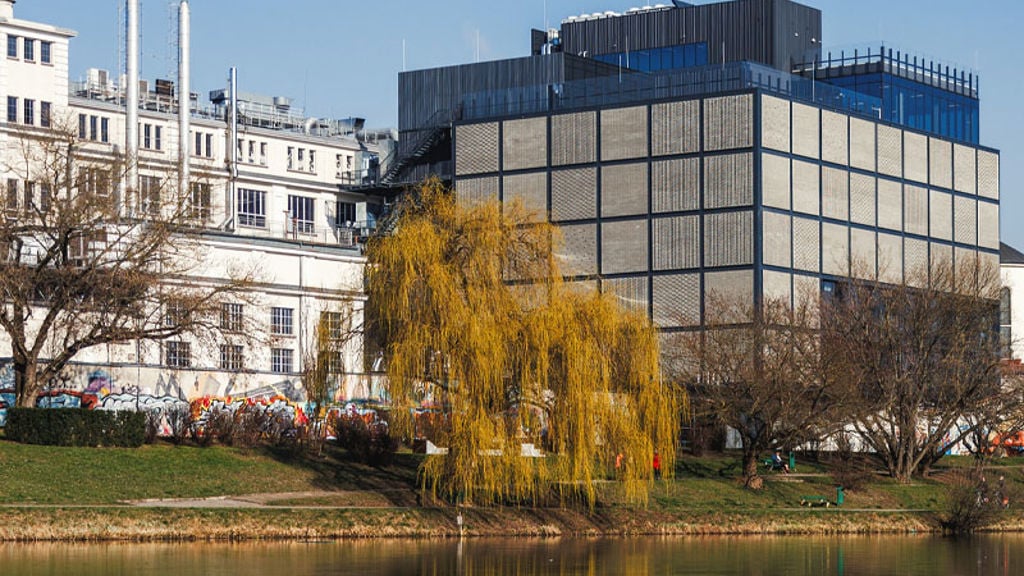Designing an intimate acoustic reverb chamber for Bjork’s Cornucopia tour
Reverberation Chamber for Bjork's Cornucopia

What we delivered
-
Design of a unique acoustic chamber for Björk’s Cornucopia tour
-
Creating a chamber shaped for maximum acoustic impact and audience visibility
-
Using materials expertise to maximise longevity and ease of maintenance
Get in touch with our team
Björk designed an entirely new kind of stage production for her Cornucopia tour.
Combining elements of live theatre, immersive media, and musical ensemble, Björk pushes the boundaries of the live concert experience. In her latest show, she sought to capture the intimacy of singing live in a small room, unaided by traditional stage amplification and audio processing. She commissioned Arup to design an acoustic reverberation chamber as part of the touring set — a unique approach to live stage performance that projects an encapsulated and intimate moment to a large-scale audience. The reverb chamber becomes both sanctuary and instrument, enabling Björk to sing in a naturally enveloping acoustic.
Our acoustic designers worked iteratively with Björk and her creative team, developing a form that achieves a lush and enveloping natural reverberation for the production. For the shape, materiality, and size of the chamber, Björk and her team worked with Shane Myrbeck, Wendy Lee, and Raj Patel, using the Arup SoundLab in their design process to develop and deliver the final form.
Based on previous experience with our SoundLab, Björk approached us for our ability to model and simulate the immersive experience of singing in the chamber. She challenged the Arup team to evaluate a wide variety of shapes and materials and relied on us to consider every implication of the chamber: acoustics first, but also audience sightlines, weight, portability, and durability in a touring environment.
Björk




Designing a form driven by sound
Björk was inspired by small chapels, natural forms, and sound sculptures like Tvisöngur in Iceland for their rich reverberation and organic quality. Because this chamber would have to be portable, we could not use the stone and masonry common to these. To evaluate materials, we calibrated our modelling process to measurements of spaces of a similar size and shape, such as the Sound Column at the Palace of the Fine Arts in San Francisco, and the Integratron sound bath in the Mojave Desert. Once our modelling process was calibrated to these shapes, we were able to explore many new forms based on our library of materials.
Björk sketched many potential shapes, inspired by anything from orchids to the Sydney Opera House. She insisted that acoustic performance should be the main design driver of the form. As such our design process was highly collaborative and iterative, with the Arup team modelling many shapes for Björk to evaluate over headphones. Once we settled on a suite of final options, Björk and the production team met in London’s SoundLab to listen critically in our purpose-built 3D sound studio. The final octagonal design created strong reflections from many directions, with a vaulted ceiling inspired by medieval chapels creating a diffuse and blended quality of sound.

Material matters
Materials had to perform acoustically first and foremost, but also required portability, durability, and visibility for audience sightlines. Our original assumption was that clear acrylic would be ideal for transparency, but the team soon determined it would not meet the acoustic requirements. The final chamber is constructed with a wood frame coated in a thick reinforced plaster composite, a combination that produces good sound and uses common building materials that can be repaired by production staff on tour.
When our design was completed, we issued documents for fabricators to use as their basis of design for build. The chamber was built by Irma Studio in Iceland, a frequent set builder for Björk’s touring productions, and constructed months in advance of rehearsals to allow time for Björk to experiment with its acoustic response and be comfortable performing inside before her residency began.

Björk / James Merry (co-creative director) / Irma Studio (builder) / Peter van der Velde (production manager) / One Little Indian (management)
Projects
Explore more arts and culture projects

Designing a creative outlet and unique venue for Bidi Bidi - transforming cultural life for Africa’s largest refugee settlement
Bidi Bidi Performing Arts Centre, Uganda

Securing the future of a 15th century building in the heart of Yorkshire
York Guildhall, United Kingdom

Advising on the transformation of 1950s silos building into a chocolate museum
E. Wedel Chocolate Factory and Museum, Poland

A space for creativity and community
The Black Library, United States of America
Get in touch with us
If you'd like to speak to one of our acoustics consultants about any of the issues raised on this page or a potential collaboration then please get in touch by completing the form.

